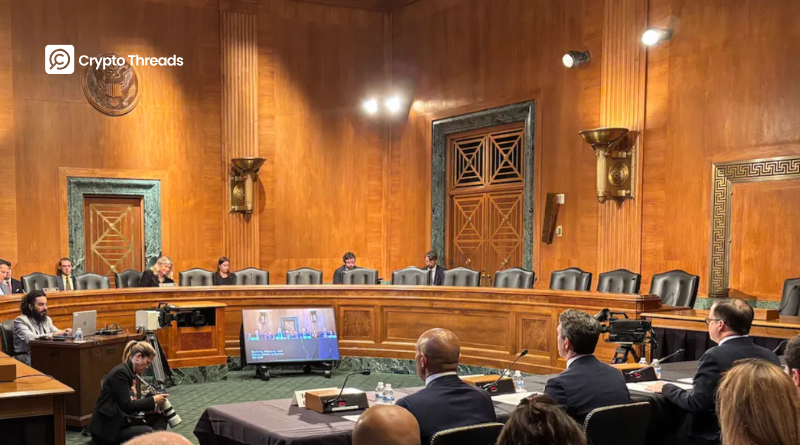DeFi Education Fund Calls for Enhanced Crypto Developer Protection in Senate Bill
Key Takeaways
- DeFi Education Fund advocates for technology-neutral crypto legislation that protects developers from inappropriate intermediary regulations
- The group emphasizes the importance of self-custody rights for all Americans and consistent federal protection for crypto developers
- A16z Crypto separately criticized the bill’s handling of subsidiary assets, preferring a digital commodity model with clear decentralization requirements
- Both organizations seek to balance innovation promotion with consumer protection in the $141 billion DeFi sector
Senate Banking Committee Receives Industry Feedback on Crypto Market Structure
The DeFi Education Fund has submitted formal recommendations to the U.S. Senate Banking Committee regarding proposed cryptocurrency market regulation following the release of a new discussion draft for critical crypto market structure legislation.
The response, signed on behalf of DeFi Education Fund members including a16z Crypto, Uniswap Labs, and Paradigm, addresses the Responsible Financial Innovation Act of 2025 (RFA). The organization argues that the legislation should adopt a more technology-neutral approach, provide enhanced protection for crypto developers against inappropriate intermediary regulations, and recognize self-custody rights as essential for all Americans.
Core Recommendations for Legislative Framework
In correspondence directed to Senate Banking Committee Chairman Tim Scott and Senators Cynthia Lummis, Bill Hagerty, and Katie Britt, the fund emphasized that legislation should address illicit finance concerns without creating unfair burdens on DeFi innovation.
The Banking Committee had specifically requested feedback on the discussion draft, which builds upon the Digital Asset Market Structure Transparency Act of 2025. The objective is to foster innovation within the $141 billion DeFi industry while maintaining consumer protection and financial stability.
Developer Protection Emerges as Primary Priority
The DeFi Education Fund has specifically called for lawmakers to update FinCEN guidance in light of the Roman Storm case involving Tornado Cash developer proceedings. The organization stated that regulations must recognize that technology consisting solely of non-custodial, non-controlling software should not be regulated as a financial institution or financial intermediary.
The crypto advocacy group also urged federal authorities to prioritize the application of state law to ensure consistent protection for crypto developers nationwide. The fund argued that traditional financial institutions with substantial resources could exploit fragmented legal landscapes by funding or encouraging state-level enforcement actions against DeFi developers, not for consumer protection purposes but to suppress competition. The organization contends that federal law should preempt conflicting state regulations.
A16z Crypto Submits Independent Analysis
A16z Crypto, the cryptocurrency division of technology-focused venture capital firm a16z, submitted separate feedback to the Senate Banking Committee addressing specific concerns about the proposed legislation.
The primary criticism from A16z regarding the crypto legislation centers on potential investor protection vulnerabilities through the creation of dangerous loopholes, particularly in the handling of subsidiary assets. The company argues that redefining these assets without substantial modifications would be inconsistent with existing U.S. securities law, specifically the Howey test framework.
A16z warned that the current proposal could enable insiders to exploit exemption provisions and sell tokens to the public without appropriate regulatory oversight. As an alternative approach, A16z supports a digital commodity model that incorporates clear decentralization requirements.
Industry Seeks Balanced Regulatory Approach
The coordinated industry response reflects broader concerns about achieving appropriate balance between fostering technological innovation and maintaining necessary regulatory protections. Both the DeFi Education Fund and A16z Crypto emphasize the importance of creating regulatory frameworks that support the continued development of decentralized finance while addressing legitimate concerns about market integrity and consumer protection.
The Senate Banking Committee’s consideration of industry feedback will likely influence the final structure of cryptocurrency market regulation as federal lawmakers work to establish comprehensive oversight of the rapidly evolving digital asset sector.



